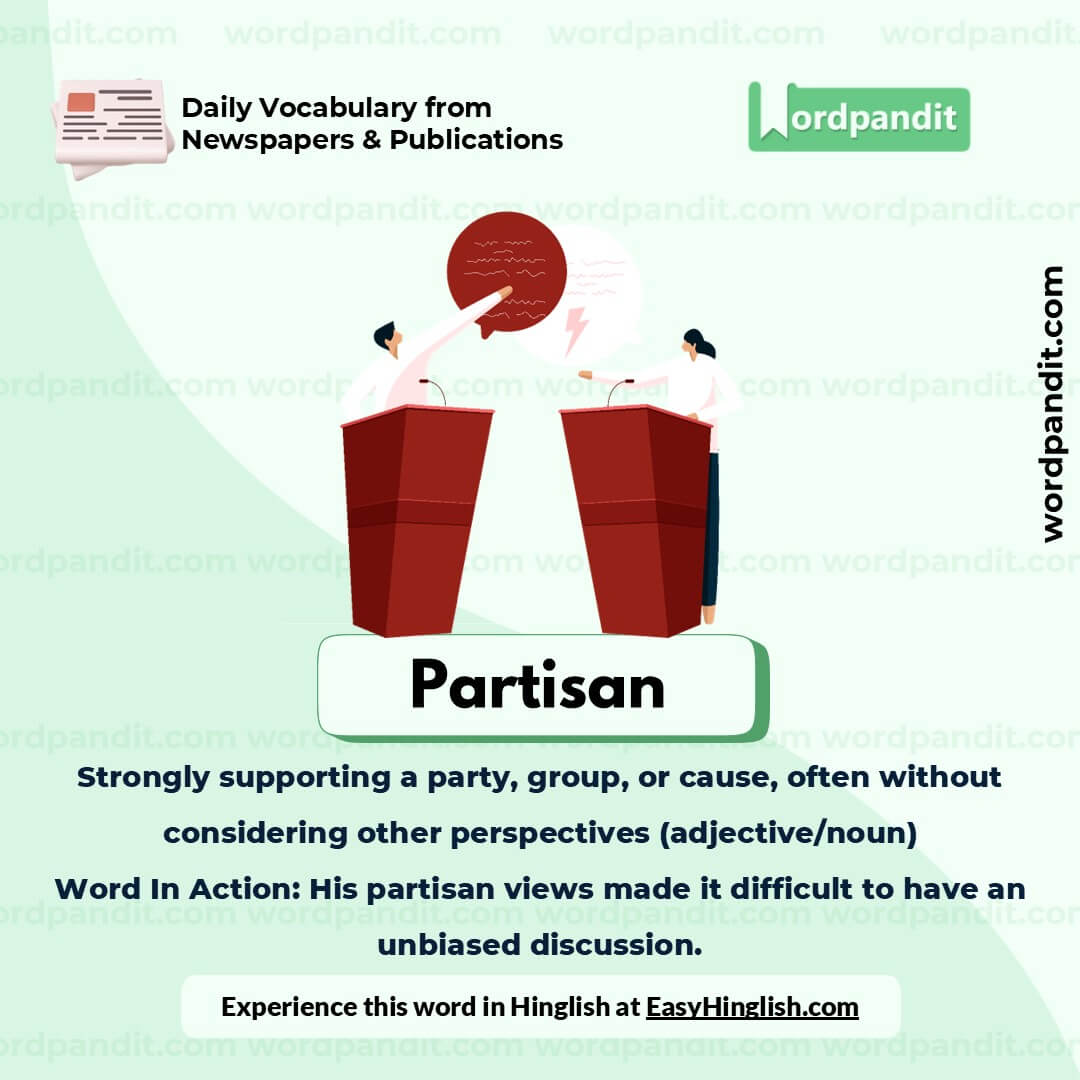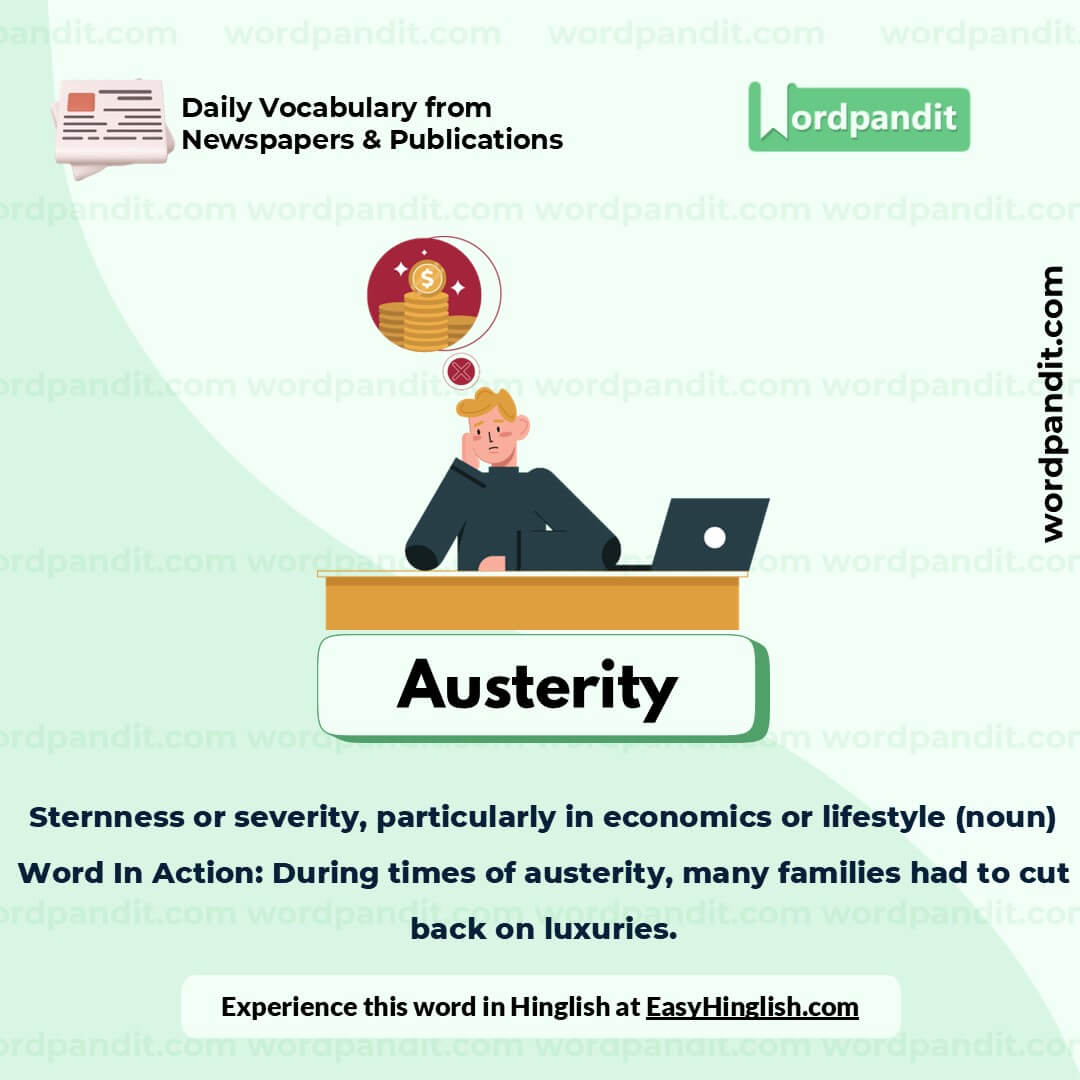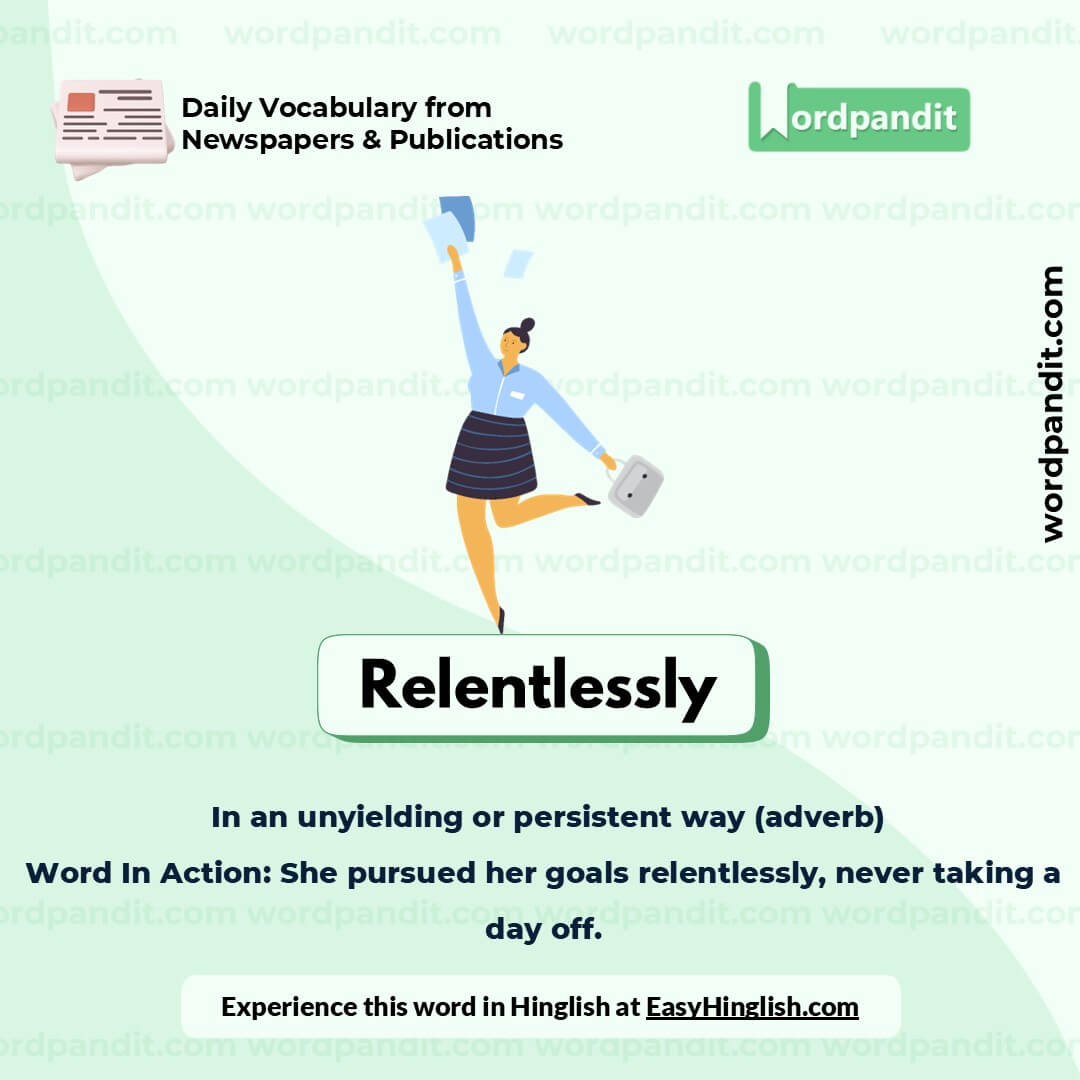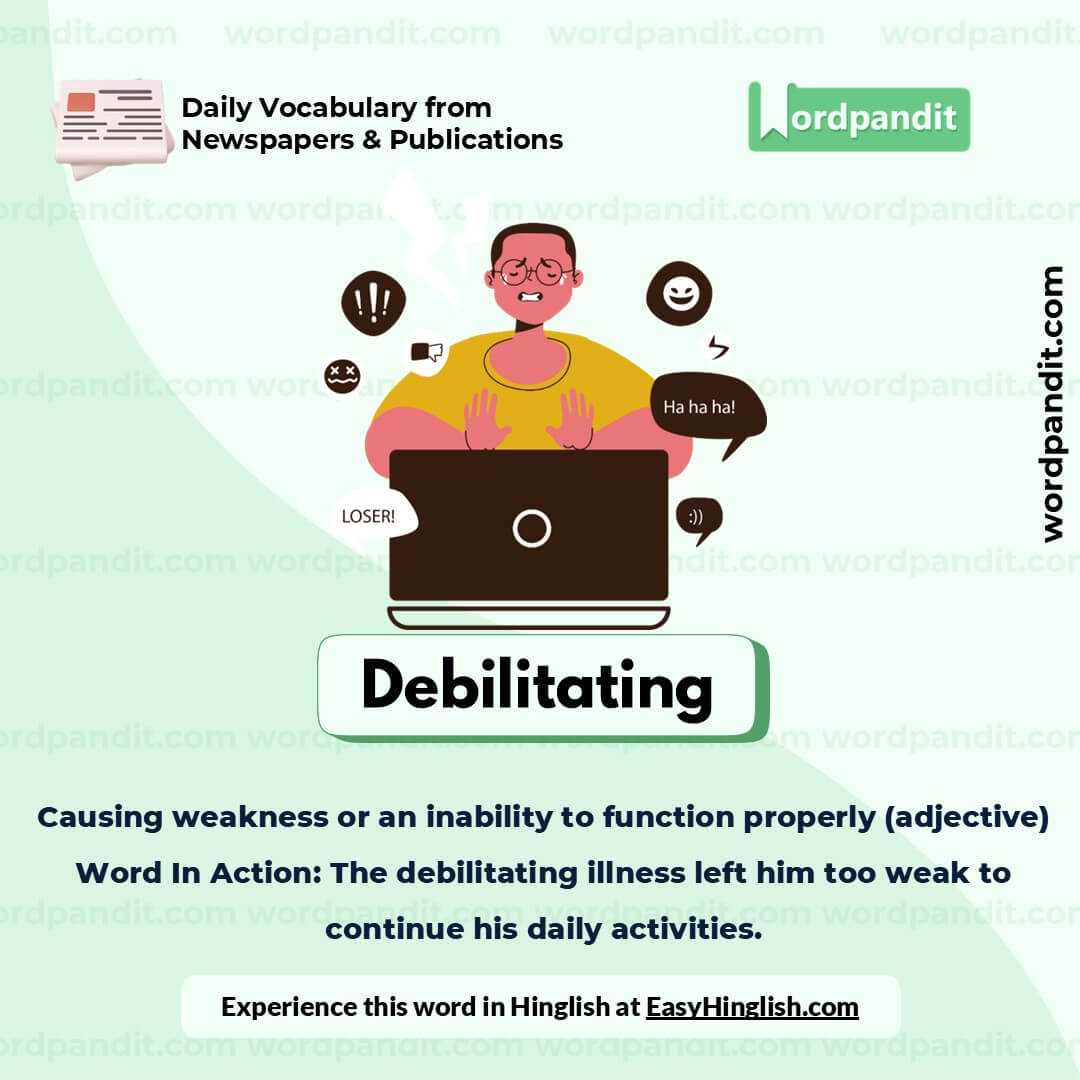Daily Vocabulary from International Newspapers and Publications
Expand Your Vocabulary with Wordpandit’s Global Vocabulary Hub
At Wordpandit, we are committed to helping you develop a truly global vocabulary by drawing from some of the most respected international publications. This section is designed to keep you ahead of the curve by introducing you to words that define global conversations and trends.
The Power of Global Sources
To help you think and communicate on a global scale, we curate vocabulary from renowned international sources, such as:
- The New York Times
- The Washington Post
- BBC
- The Guardian
- The Economist
- Scientific American
- Psychology Today
- And many more...
Stay Global, Stay Competitive
Our daily updates from international publications ensure you are consistently exposed to new words that reflect global news and developments, making sure your vocabulary is not only current but also globally relevant.
Enhance Your Global Perspective
Whether you’re preparing for international exams, aiming to excel in global business communication, or want to enhance your language skills for personal growth, Wordpandit offers the resources you need to thrive in a global context.
Effective Learning, Global Reach
Our learning methodology combines global examples, memory aids, and interactive activities, allowing you to internalize new words effectively and apply them in real-world scenarios.
Begin Your Global Vocabulary Journey Now!
Why Choose Wordpandit?
Practical Learning: Focus on words you'll actually encounter in real-world reading, enhancing your comprehension and communication skills.
Diverse Content: From current affairs to scientific breakthroughs, our varied sources expose you to vocabulary across multiple domains.
Effortless Integration: Make Wordpandit a part of your daily routine. Just a few minutes each day can significantly boost your lexicon over time.
Your Path to Vocabulary Mastery
- Visit our Daily Vocabulary section regularly
- Explore new words and their usage in context
- Practice incorporating these words into your own writing and speech
- Track your progress as your vocabulary expands
Start Your Journey Today
Embark on your vocabulary enhancement journey with Wordpandit. By consistently engaging with our daily posts, you'll build a robust vocabulary that serves you well in academic, professional, and personal contexts.
Remember, a word a day keeps linguistic limitations at bay. Make Wordpandit your daily companion in the quest for vocabulary excellence!
WORD-1: Dire
Context:
"The obesity epidemic, one of the most dire public health crises" - The Washington Post
Explanatory Paragraph:
The word dire describes situations that are extremely serious or urgent. When something is dire, it is often a sign of a major problem, requiring immediate attention or action to prevent further damage or disaster.
Meaning: Extremely serious or urgent (adjective)
Pronunciation: dahy-er
Difficulty Level: ⭐⭐⭐ (Intermediate)
Etymology: From Latin dirus meaning "fearsome, dreadful"
Synonyms & Antonyms:
Synonyms: dreadful, alarming, disastrous, grave, urgent
Antonyms: trivial, minor, unimportant, insignificant
Usage Examples:
- The country is in dire need of medical supplies following the earthquake.
- Dire warnings about the effects of climate change are often ignored.
- The company is in a dire financial situation after the failed merger.
- His health was in dire condition, and he required immediate surgery.
Cultural Reference:
"We must act swiftly; the situation is dire." - Commonly heard in movies or reports about crises
Think About It:
Why do some people fail to respond to dire situations until it is too late?
Quick Activity:
Write a short paragraph describing a dire situation, real or fictional, and how it might be resolved.
Memory Tip:
Think of the word "dire" as "desperate in urgency" to help recall its meaning of an extreme or urgent situation.
Real-World Application:
Understanding and using the word "dire" can help convey the seriousness of situations, especially in writing or discussions involving crises or urgent matters.
WORD-2: Partisan
Context:
"The contributors are courteous, curious, knowledgeable, generous, and nonpartisan." - The Washington Post
Explanatory Paragraph:
Partisan refers to a strong, often blind allegiance to a particular political party, cause, or group. A partisan person or view typically shows bias or loyalty, favoring one side over others, often without regard to fairness or objectivity.
Meaning: Strongly supporting a party, group, or cause, often without considering other perspectives (adjective/noun)
Pronunciation: PAHR-tuh-zuhn
Difficulty Level: ⭐⭐⭐ (Intermediate)
Etymology: From Middle French partisan meaning "supporter of a party"
Synonyms & Antonyms:
Synonyms: biased, one-sided, sectarian, loyal, prejudiced
Antonyms: nonpartisan, impartial, objective, unbiased, neutral
Usage Examples:
- The debate turned into a partisan argument, with neither side willing to compromise.
- Partisan media outlets often present news from a heavily biased perspective.
- Her decision was criticized as being overly partisan, ignoring broader concerns.
- The goal of the committee is to find a nonpartisan solution to the problem.
Cultural Reference:
"Partisan politics" is a term commonly used in the United States to describe political parties that focus solely on their own interests, often leading to gridlock in government.
Think About It:
Why is it important for media or decision-making bodies to avoid being partisan? How can bias affect fairness?
Quick Activity:
Write down examples of how partisanship can be beneficial or harmful in political discussions or decision-making.
Memory Tip:
Think of "partisan" as "part" of a group, showing loyalty to one part (or side) without considering the whole.
Real-World Application:
Understanding the concept of partisanship is crucial in politics, journalism, and discussions where neutrality and fairness are essential.
WORD-3: Austerity
Context:
"The United States was predestined to administer a somewhat austere bureaucracy." - The Washington Post
Explanatory Paragraph:
Austerity refers to strictness, seriousness, or severity, often in terms of lifestyle, policies, or appearance. It can describe governmental measures that limit spending or personal approaches that avoid excess. In a broader sense, it highlights the absence of comfort or luxury.
Meaning: Sternness or severity, particularly in economics or lifestyle (noun)
Pronunciation: aw-STEH-ri-tee
Difficulty Level: ⭐⭐⭐ (Intermediate)
Etymology: From Old French austerité and Latin austeritas, meaning "harshness or strictness"
Synonyms & Antonyms:
Synonyms: severity, frugality, restraint, simplicity, rigor
Antonyms: indulgence, luxury, excess, extravagance, opulence
Usage Examples:
- After the economic crisis, the government introduced austerity measures to cut public spending.
- The austerity of the decor in the room made it feel cold and unwelcoming.
- Living under austerity policies meant that many social programs were reduced or eliminated.
- Despite the austerity of their lifestyle, they found happiness in the simple things.
Cultural Reference:
"Austerity" often comes up in discussions of economic policies, such as in the European Union after the 2008 financial crisis, when many countries were forced to adopt austerity measures.
Think About It:
How does living in a time of austerity impact people's mental well-being and social relationships?
Quick Activity:
Write about a time when you had to live with fewer resources or under strict conditions. How did it affect your daily life?
Memory Tip:
Remember "austerity" by thinking of "austere" as meaning "severe" or "without luxury"—both words share the same root and connotation.
Real-World Application:
Austerity is often used in discussions of government policy, especially when dealing with budget cuts or financial crises, highlighting the balance between spending and restraint.
WORD-4: Relentlessly
Context:
"Americans’ waistlines have grown relentlessly for decades." - The Washington Post
Explanatory Paragraph:
Relentlessly describes something that happens in a constant, harsh, or unstoppable way. It implies that the action continues without easing or giving up, often in a way that feels overwhelming or difficult to stop.
Meaning: In an unyielding or persistent way (adverb)
Pronunciation: ri-LENT-liss-lee
Difficulty Level: ⭐⭐⭐ (Intermediate)
Etymology: From the word "relent," meaning to soften or yield, with the suffix "-less" implying the absence of softening
Synonyms & Antonyms:
Synonyms: persistently, continuously, unremittingly, tirelessly, incessantly
Antonyms: occasionally, intermittently, sporadically, infrequently
Usage Examples:
- The rain fell relentlessly, soaking everything in sight.
- She pursued her career goals relentlessly, never taking a break.
- The army advanced relentlessly, despite the enemy's efforts to stop them.
- He was relentlessly optimistic, always finding the bright side no matter the circumstances.
Cultural Reference:
"Relentless" is often used to describe powerful forces, such as the relentless pursuit of a dream or a relentless storm, frequently seen in literature and films.
Think About It:
What are the benefits and drawbacks of being relentless in pursuing a goal or ambition?
Quick Activity:
Describe a situation where you or someone you know showed relentless effort. What was the result?
Memory Tip:
Remember "relentlessly" by thinking of "relent" as to give in, and "relentless" meaning the opposite—never giving in or stopping.
Real-World Application:
The word "relentlessly" can be used in discussions about determination, perseverance, and unstoppable progress in various fields, including science, sports, and personal growth.
WORD-5: Debilitating
Context:
"A costly, debilitating and deadly trend." - The Washington Post
Explanatory Paragraph:
Debilitating refers to something that weakens or incapacitates a person, system, or situation. It describes effects or conditions that gradually sap strength or efficiency, often leaving one unable to function properly.
Meaning: Causing weakness or an inability to function properly (adjective)
Pronunciation: dih-BIL-ih-tay-ting
Difficulty Level: ⭐⭐⭐ (Intermediate)
Etymology: From Latin debilitare, meaning "to weaken"
Synonyms & Antonyms:
Synonyms: weakening, exhausting, incapacitating, draining, crippling
Antonyms: strengthening, invigorating, energizing, fortifying, revitalizing
Usage Examples:
- The debilitating effects of the illness left him bedridden for weeks.
- Stress can have a debilitating impact on both mental and physical health.
- The economic downturn was debilitating for small businesses across the country.
- The heat during the summer months can be debilitating, making outdoor work nearly impossible.
Cultural Reference:
The term "debilitating" is often used in medical contexts, such as describing the effects of chronic diseases like arthritis, which cause long-term weakness and pain.
Think About It:
What are some ways to cope with or overcome debilitating conditions, whether physical or emotional?
Quick Activity:
Think of a situation where you felt debilitated by a challenge. Write down what helped you regain your strength or focus.
Memory Tip:
Remember "debilitating" by associating it with "debility" or weakness, which the word directly refers to.
Real-World Application:
Debilitating is commonly used in healthcare, psychology, and other fields to describe conditions that greatly reduce someone's ability to function, making it a key term in discussing chronic illness or stress.


















